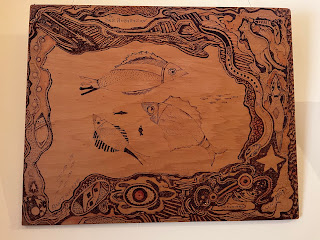In 1949, he made the long journey on the transport
ship, Wooster Victory to Australia,
docking in Adelaide where he stayed. He
arrived here with his wife.
Juozas again entered university, this time in Adelaide in
1959. He entered the public service and
worked with the SA Electricity Trust on mechanical projects.
Outside of work he was heavily involved with the Lithuanian
community in Adelaide. He was a founding
members of the sports Club Vytis, a
member of the Adelaide Lithuanian students association from 1959 – 1961,
parents committee of Vilniaus scouts and teacher at Lithuanian school.
In 1962 he acted as Vice-President of the ‘Voice of Witness
of Communist expansion” and later the Australian European Freedom
Alliance. In 1966 he was Vice-President
of Captive Nations.
Juozas was concerned with how Lithuania was represented in
printed material, newspapers and books.
He would write to publishers pointing out mistakes or misguided information.
In 1969 he began to correspond with the State Library of South Australia,
suggesting books that the Library could purchase about Lithuania. He had compiled a list of books that the
Library held, relating to Lithuania, 40
books in all on various aspects of Lithuania.
Juozas also appealed to the Lithuanian community in Adelaide to donate
books that might better represent Lithuania in the State Library. He went one step further; writing to
Publishers seeking to purchase books which he would then donate to the Library. Within a short time the State Library
increased its collection of book on Lithuanian to 67.
In 1969, it was publicised that the Red Army choir would be
coming to Adelaide to perform. Juozas
strongly opposed this and wrote numerous letters to politicians and newspapers expressing
his disapproval. To him it was “an insult
to all of us, originally from the countries behind the iron curtain. Our relatives and loved ones have suffered
persecution. We, the Australian citizen
from behind the Iron Curtain now living in Adelaide have been forced to leave
our homeland by the advancing Red Army and have lost everything, except our
lives”.
He signed these letters as Ju-Ra, as he feared reprisals for
his relatives still in Lithuania.The Baltic Council of Australia and the Captive nations Committee of SA also sought to stop the participation of the Red Army choir from performing in the Adelaide Festival of Arts in 1970. The Baltic Council published an advert in the Advertiser (20 February 1969) which states; The choir was symbolic of totalitarian regimes and that it was a propaganda unit which existed to glorify the Soviet in song and dance.
The chairman of the Adelaide Festival of Arts J C Irwin
defended the decision to allow the group to perform. The Red Army Choir did not perform in the
Festival of Arts.






No comments:
Post a Comment